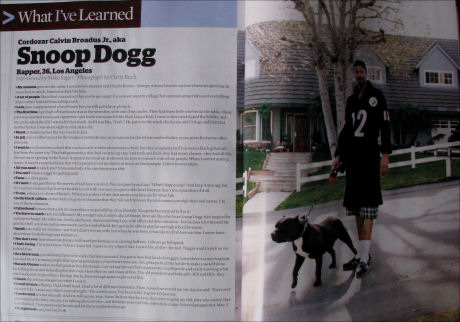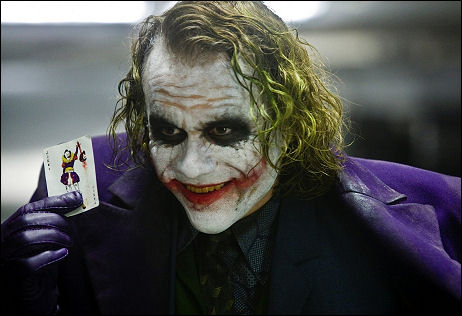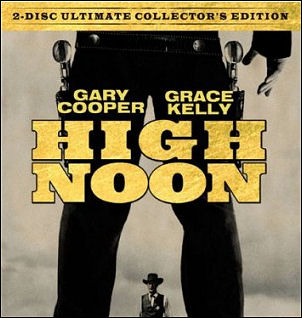Not a spoiler unless you live under a rock: A friend tells me he saw an Incredible Hulk TV ad yesterday that uses a line or two from the scene in which Robert Downey, Jr.‘s Tony Stark (i.e., Iron Man) strolls into a bar and has words with William Hurt‘s asshole general with a moustache. What I’m not sure of is whether the spot shows Downey saying, “We’re looking to put a team together.”
This refers, of course, to a Avengers (i.e., not Justice League) movie down the road, which will basically be just another X-Men series without the gay-culture metaphor, or perhaps to a story thread that may be used in the next Hulk film (if there is one). I got an enjoyable little ping when this scene came at the end of the film (which I saw last night) but no one else will get this same chuckle with the cat totally out of the bag. Universal marketers obviously used Downey to get the Iron Man crowd as hopped up as possible, but it really does pay to see things early to avoid the ad-trailer spoiler effect.
Open, Optimistic, Different
“It would not be an exaggeration to say that the Democrats’ nomination of Barack Obama as their candidate for president has done more to improve America’s image abroad — an image dented by the Iraq war, President Bush’s invocation of a post-9/11 ‘crusade,’ Abu Ghraib, Guantanamo Bay and the xenophobic opposition to Dubai Ports World managing U.S. harbors — than the entire Bush public diplomacy effort for seven years,” writes N.Y. Times columnist Thomas L. Friedman in a piece dated 6.11
“Of course, Egyptians still have their grievances with America, and will in the future no matter who is president — and we’ve got a few grievances with them, too. But every once in a while, America does something so radical, so out of the ordinary — something that old, encrusted, traditional societies like those in the Middle East could simply never imagine — that it revives America’s revolutionary ‘brand’ overseas in a way that no diplomat could have designed or planned.
“Egyptian officials [are] particularly excited about Obama’s nomination because it might mean that being labeled a ‘pro-American’ reformer is no longer an insult here, as it has been in recent years. As one U.S. diplomat put it to me: Obama’s demeanor suggests to foreigners that he would not only listen to what they have to say but might even take it into account. They anticipate that a U.S. president who spent part of his life looking at America from the outside in — as John McCain did while a P.O.W. in Vietnam — will be much more attuned to global trends.
“Yes, all of this Obama-mania is excessive and will inevitably be punctured should he win the presidency and start making tough calls or big mistakes. For now, though, what it reveals is how much many foreigners, after all the acrimony of the Bush years, still hunger for the ‘idea of America’ — this open, optimistic, and, indeed, revolutionary, place so radically different from their own societies.”
Dogg and Baby Girl
“Barack Obama makes me feel good to be a black man. Just seein’ him up there representin’ intelligently and really knowing what he talkin’ about and defending his shit even when they try and shoot at him. The old president and baby girl — Bill and Hill — they tried to double wop on him. Boo bop. But he have enough game to get out of that.”

Snoop Dogg “What I’ve Learned” spread spread in current issue of Esquire — page 104 and 105 interviewed by Mike Sager
Honestly — what is that with African-American guys and scary dogs? Has anyone ever seen a rapper walking around with a love dog of any kind? A golden retriever, say, or a cocker spaniel or anything that isn’t bred to maul and bite and inspire fear? Always the pit bulls with these guys and the threat of having your ankle bone crushed into splinters when the beast lunges at you and sinks his teeth in.
Never So Serious

The yellow teeth are perfect.
The Indy That Died
Is this the real deal ? Frank Darabont‘s script of Indiana Jones and the City of the Gods, I mean? The legendary Indy 4 script that Steven Spielberg and Harrison Ford allegedly liked, but which George Lucas didn’t and vetoed? Apparently so.
But if you’re interested in reading this 11.4.03 draft, you’d better copy it quick. I’ve been told that Paramount will come down hard on anyone who’s linking to the original website that’s running it, which is an outfit called PDF Screenplays.
PTA, Nicholson, Gambling
Jo Blo is pointing to some loose talk on Cigarettes and Red Vines, Paul Thomas Anderson’s blog, as an indication of what might be Anderson’s next film. “Anderson may be taking on Power Play,” he reports, “about the ongoing battles between Las Vegas casinos and Native American tribes. Jack Nicholson was at one time attached to the script but it’s unclear if he’d be involved in PTA’s version.”
The Power Play script “was written by Peter Bart, the editor-in-chief of Variety,” he explains. “Bart was suspended for three months because the sale of the script violated Variety policy (Bart later reformatted the script as a novella to get around this issue). That in and of itself is an interesting story but off point. We probably won’t hear much word on Anderson’s next project for a little while longer but the thought of Anderson working with Nicholson is pretty exciting.”
The actual Cigarettes and Red Vines item, posted last Saturday (6.7) by a guy named “C.J. Wallis,” reads as follows: “We√ɬ¢√¢‚Äö¬¨√¢‚Äû¬¢ve gotten a bunch of various projects and things sent to us that Paul is (or is not) √ɬ¢√¢‚Äö¬¨√Ö‚Äúseconds away from shooting,√ɬ¢√¢‚Äö¬¨√Ǭù etc., etc. The latest one is a film called Power Pl;ay, apparently set to star Jack Nicholson about a gambling entrepreneur from a Native American casino who decides to take on Las Vegas.
“The film is through Paramount Pictures and Robert Evans, based on the Peter Bart novel. No official word obviously from The Family, but I√ɬ¢√¢‚Äö¬¨√¢‚Äû¬¢ll see what comes from asking.”
Clinton Explains It
Here’s Bill Clinton talking about why he loves High Noon — a riff on why he thinks it’s great, and what the central theme or message of it is. Now that the denigrate-and-marginalize-Barack-Obama-at-all-costs phase of his life is over, I’m starting to like the guy all over again.
Brown T-Shirt, Baby
Because Brad Silberling (Lemony Snicket’s A Series of Unfortunate Events, Casper) is directing, the odds are that Land of the Lost (Universal, 7.17.09), an animated adventure and his latest big-time venture, will turn out decently. But the Lost swag that arrived today was a bust. If you’re going to send out swag, send the kind that impresses and not the kind that makes guys like me write little diss pieces like this.

Leaning against my front door was a decent-sized cardboard box containing another cardboard foldout display deal covered in movie art, and inside the box was….a brown T-shirt. With the word “Sleestak” on the chest and a picture of a monkey with saucer-sized Invaders from Mars mutant eyes. Plus a Land of the Lost theme song playing on a dinky little music player that wouldn’t work until you popped in the double A batteries.
Silver Smooth Heaven
I was skeptical when I first heard of it, but Lionsgate’s two-disc Ultimate Collector’s Edition DVD of High Noon, which came out yesterday, is drop-dead beautiful. The monochrome images from this 1952 Fred Zinneman are so rich and lustrous and pulsing with biological exactitude that this DVD has instantly joined my all-time pantheon. And they haven’t even come out with a Blu-Ray version yet. It’s so immaculate with such an intriguing variance of tones that it’s almost like color.

Grace Kelly as she appears in a scene in the new Lionsgate Special Collector’s edition DVD of High Noon
I was going to say this new Noon is right up there with the Columbia-TriStar Home Video DVD of Anatomy of a Murder (rendered by the great Grover Crisp), but the DVD it reminded me of the most is Paramount Home Video’s “grain-rape” version of Sunset Boulevard. That suggests that the new High Noon has been grain-raped also, but it hasn’t been — and yet it looks as if it has. That’s the odd thing here.
Dustin Dean, Lionsgate’s director of DVD production, says the reason for the new Noon‘s radiant, super-sharp appearance is that “we maxed out the bitrate…[and] the compression is different than when it was mastered the last time.” The company hired to do the actual “authoring” worked from a high-def source that, according to an Amazon report, came from “a new transfer of the film, restored by Paramount.” Dean says that digital transfer technology has improving every year and so “the compression has become better….better compression, higher bit rate, a better encoder.”
Some of the purists out there condemned the Sunset Boulevard DVD because the transfer (a beautiful job by John Lowry of Lowry Digital) removed the celluloid grain effect from the image, and serious film restorers believe that the only honest way to master a black-and-white film is to retain the grain, which they say is integral to the image and in fact is essential to its constitution.

Being an Okee from Muskogee with a piece of hay between my teeth, I’ve never really bought this argument because Lowry’s Sunset Boulevard was so smooth and silvery and detailed beyond belief. It was heaven to me because the image seemed fresh as today, in part because that silver Iraqi sandstorm effect had been obliterated. The surprise in Lionsgate’s Noon DVD is that it appears to have been Lowry-ized — there isn’t a speck of grain in the whole thing.
Here’s’ the DVD Beaver comparison of the old Noon DVDs (Artisan, Republic…whatever) and the newbie.
Good Old Days
Sometime in the late ’90s Guillermo del Toro shared an opinion about laser discs that I’ve never forgotten. “Laser discs are to DVD,” he said, “as vinyl records are to CDs.” Meaning, in effect, that laser discs were truer to the look of film — more celluloidy — than the digital bit reconstitutions that are DVDs.
GDT knows whereof he speaks, so yeah, okay, maybe. I was pretty happy with the format in the early to mid ’90s, but then I began to notice laser rot affecting the occasional disc, and then DVDs started to come in around ’97 and I eventually threw my Pioneer laser disc player into the dumpster. LDs were fine as far as it went — revolutionary at the time — but life and technology have moved on, thank god.
All to say that Mark Altman‘s recollection piece about the good old laser disc days, appearing on The Digital Bits, is well written and worth reading, etc. But I’ll never forget that put-put sound my old rinky-dink Pioneer player used to make toward the end, and how four times out of five it would grunt and whine and sputter when I hit play. May it rot in hell!

